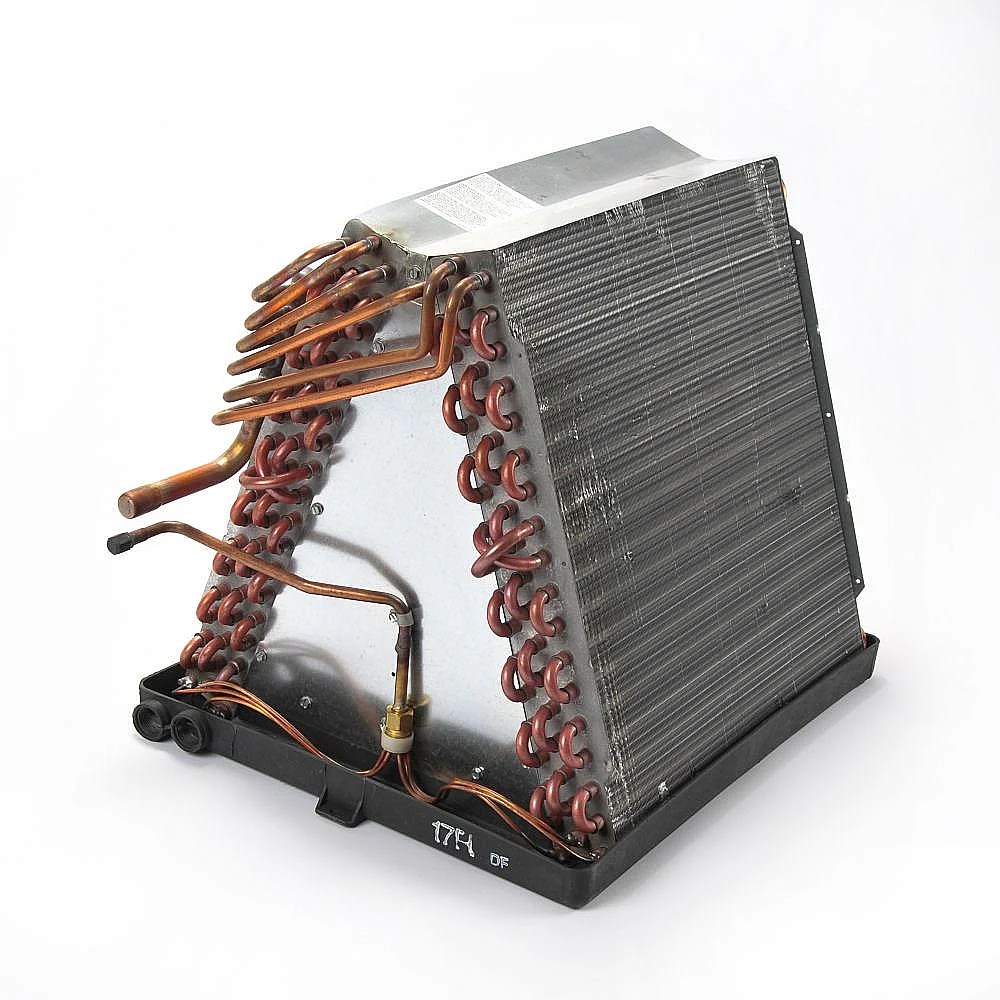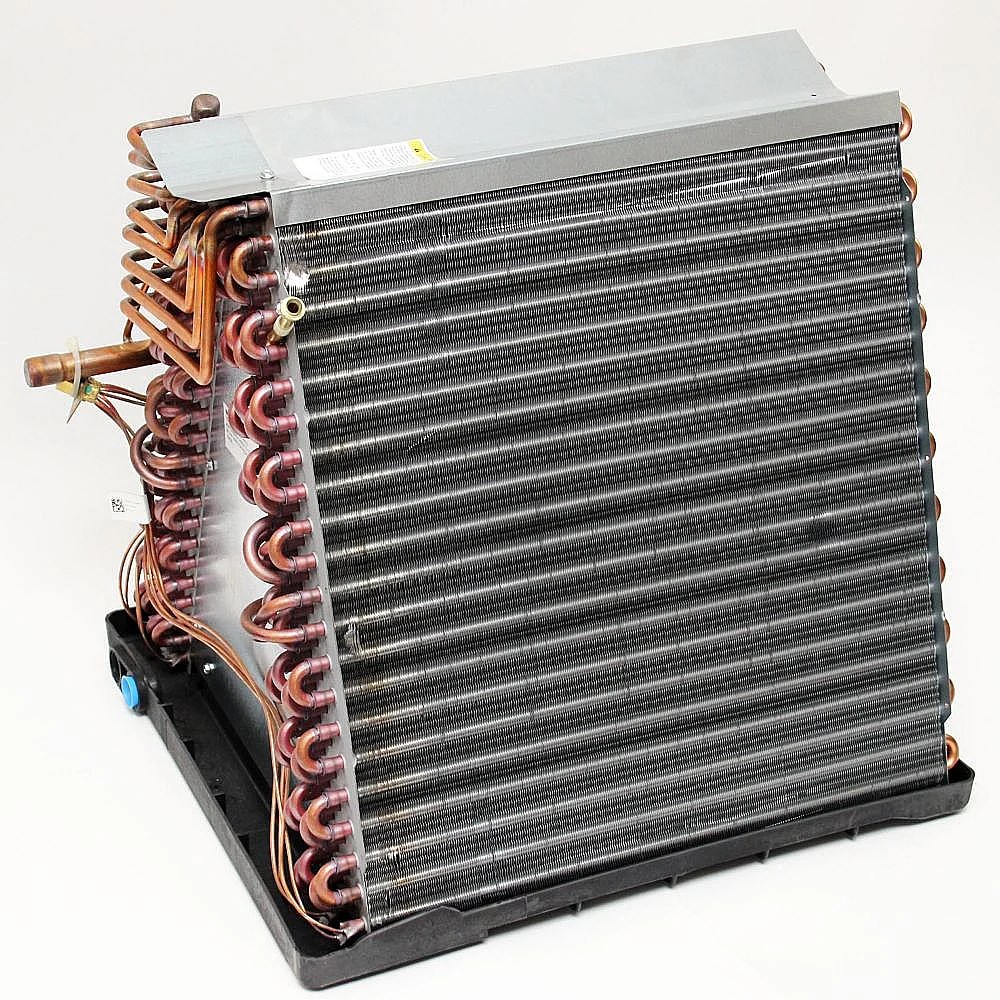Decoding the AC Evaporator Coil: Your Guide to Cool Comfort
Ever wonder what's the real magic behind your air conditioner's cooling power? It's not just cold air being blown around – there's a crucial component called the evaporator coil that makes the whole process possible. This unsung hero of your AC system is responsible for absorbing the heat and humidity from your indoor air, leaving you with that refreshing coolness we all crave on a hot day.
So, what is an AC evaporator coil? Simply put, it's a network of copper or aluminum tubing, usually finned to increase surface area, that resides within the indoor unit of your air conditioning system. Refrigerant, a special fluid, flows through these coils, absorbing heat from the air blown across them by the indoor blower fan. This process of heat absorption cools the air, leaving you with a comfortable indoor environment.
The concept of cooling air using evaporation goes back centuries, but the modern AC evaporator coil is a product of the 20th century, evolving alongside refrigeration technology. Its development has been instrumental in making air conditioning accessible and affordable for homes and businesses worldwide. Imagine a world without AC, especially in hot and humid climates – the evaporator coil is a critical piece of technology that greatly improves our comfort and productivity.
The importance of a properly functioning evaporator coil cannot be overstated. A clean and efficient coil ensures optimal cooling performance, lower energy bills, and a longer lifespan for your AC system. Conversely, a dirty or damaged coil can lead to a variety of problems, from reduced cooling capacity and increased energy consumption to complete system failure. Understanding how your evaporator coil works and how to maintain it can save you money and headaches down the road.
One of the most common issues related to AC evaporator coils is freezing. This typically occurs when airflow across the coil is restricted, for example, by a dirty air filter or closed vents. Reduced airflow prevents sufficient heat from reaching the coil, causing the refrigerant inside to become too cold and freeze. Other problems can include leaks, corrosion, and general wear and tear.
Three key benefits of a well-maintained AC evaporator coil are: improved cooling efficiency, lower energy costs, and extended system lifespan. A clean coil allows for optimal heat transfer, meaning your AC doesn't have to work as hard to cool your space, leading to lower energy consumption and utility bills. Regular maintenance also prevents premature wear and tear, extending the life of your AC system.
To ensure your evaporator coil stays in top shape, consider having it professionally inspected and cleaned annually. You can also contribute to its longevity by regularly changing your air filters and ensuring proper airflow throughout your home.
Advantages and Disadvantages of Evaporator Coils
| Advantages | Disadvantages |
|---|---|
| Efficient Cooling | Prone to Freezing |
| Improves Air Quality (when paired with filters) | Can Develop Leaks |
| Relatively Long Lifespan with Proper Maintenance | Requires Regular Maintenance |
Five best practices for maintaining your evaporator coil: 1. Change your air filter regularly. 2. Ensure adequate airflow by keeping vents open and unobstructed. 3. Schedule annual professional inspections and cleaning. 4. Address any leaks promptly. 5. Keep the area around your indoor unit clean and free of debris.
Frequently Asked Questions: 1. What is the purpose of an evaporator coil? (To absorb heat and humidity from indoor air). 2. How often should I clean my evaporator coil? (Professionally, annually). 3. What are signs of a faulty evaporator coil? (Reduced cooling, freezing, unusual noises). 4. Can I clean my evaporator coil myself? (While possible, professional cleaning is recommended). 5. How much does it cost to replace an evaporator coil? (Varies, but can be a significant expense). 6. What is the difference between an evaporator coil and a condenser coil? (Evaporator coil is indoors, absorbs heat; condenser coil is outdoors, releases heat). 7. How can I prevent my evaporator coil from freezing? (Ensure proper airflow and address any refrigerant leaks). 8. What is the lifespan of an evaporator coil? (Typically 10-15 years with proper maintenance).
Tips and tricks for maintaining your AC evaporator coil include monitoring your system's performance for any changes in cooling efficiency, checking for ice buildup on the coil, and paying attention to any unusual noises coming from the unit. Early detection of problems can often prevent more serious issues and costly repairs down the road.
In conclusion, the AC evaporator coil is a vital component of your air conditioning system, playing a critical role in keeping your home cool and comfortable. Understanding its function, importance, and potential problems can empower you to take proactive steps to maintain its efficiency and extend the lifespan of your AC system. From regular filter changes and professional cleanings to promptly addressing any leaks or performance issues, taking care of your evaporator coil is an investment in your comfort and your wallet. By understanding the vital role the evaporator coil plays, you can make informed decisions about its maintenance and enjoy the benefits of a cool and comfortable home for years to come. Don't underestimate the power of this small but mighty component - it's the key to beating the heat and enjoying a refreshing indoor environment, no matter the temperature outside.
Regain your strength with bright star rehab physical therapy pc
Why did ryan reynolds buy mint mobile a hollywood ending for your wallet
Unpacking the charm and controversy come on a my house lyrics explored














